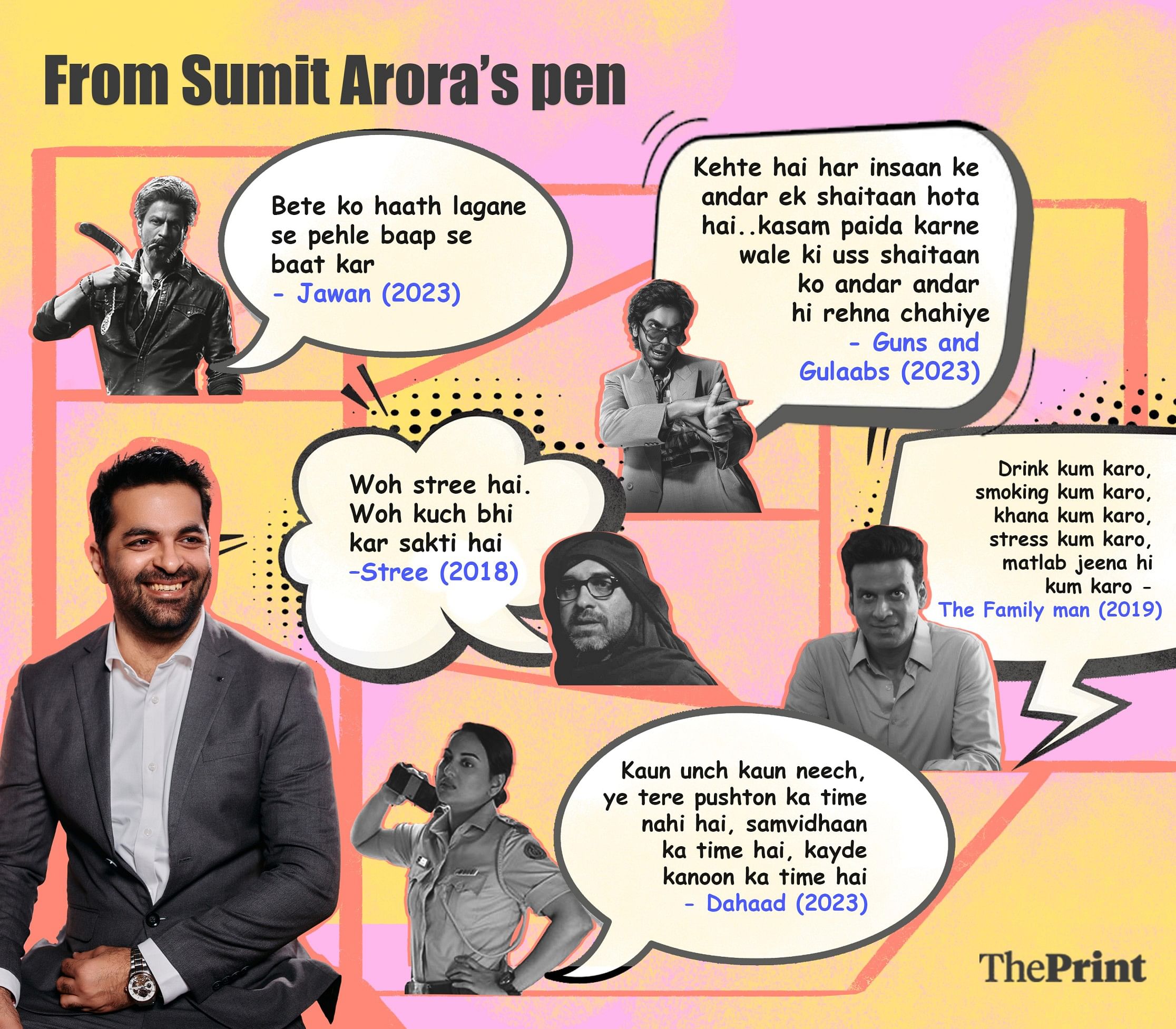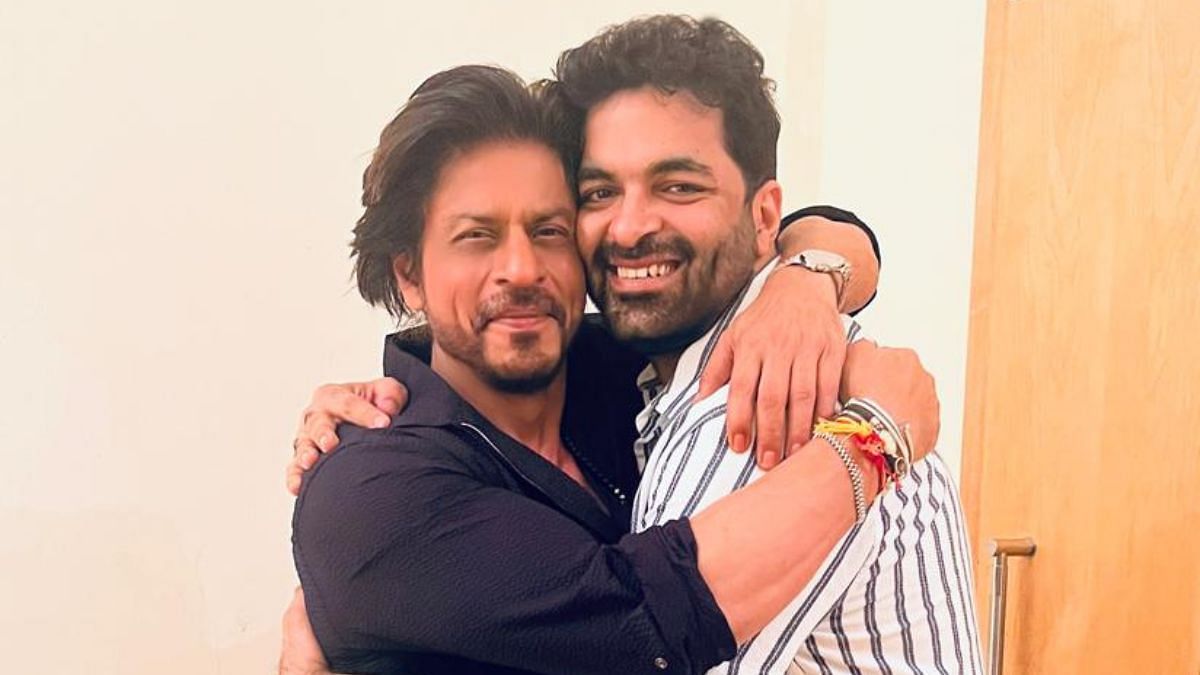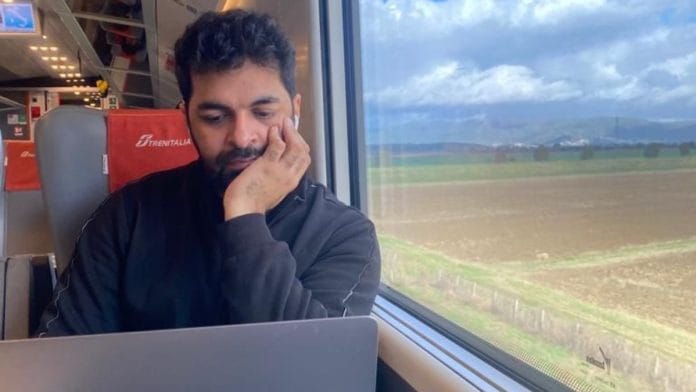Bete ko haath lagane se pehle baap se baat kar — Talk to the father before laying a hand on the son. When Shah Rukh Khan said this line in 2023 blockbuster Jawan, the audience in the theatre couldn’t stop itself from hooting. There was roar. They had understood the weight of those words. And when Manoj Bajpai’s character in The Family Man went on a rant, saying Drink kum karo, smoking kum karo, khana kum karo, stress kum karo, matlab jeena hi kum karo, his anger finds resonance among many Indians who associate with this situation they often find themselves in. Memes on this scene with millions of views are a proof.
That’s the power punchy dialogues hold in Bollywood. And that power these days is being held by Sumit Arora, the man from Meerut’s Bhoosa Mandi who has made it big in tinsel town. The 35-year-old has already worked with some of the best in both films and OTT. His portfolio boasts of names like Atlee, Kabir Khan, Raj & DK, and Zoya Akhtar. He has got the entire nation relating hard with his writing. And he is taking the star out of the characters saying his dialogues.
“When I write dialogues for actors I know are already on board, I keep in mind how they will sound while saying those. It is not that it has to sound like the actor’s persona, but how the actor will sound saying a particular line,” said Arora.
My humour is influenced by the reality of growing up in Meerut, and the great satirists of Hindi literature like Harishankar Parsai, Sharad Joshi, Shrilal Shukla, and Gyan Chaturvedi
— Sumit Arora
Also read: Goa isn’t just a party capital, it is a start-up hub too. And women are driving it
The art, the influence
Like millions of Indians, Arora too was a film buff growing up in a small town. What differentiated him though was his clarity of thought as a youngster. He wanted to write the incredible stories he watched unfold on big screen. It was Lagaan that convinced Arora that writing for cinema can be beyond fight scenes, and goons.
Humour and satire is a big part of his writing, visible in his works such as Stree, The Family Man, Guns and Gulaabs and Dahaad.

“My humour is influenced by the reality of growing up in Meerut, and the great satirists of Hindi literature like Harishankar Parsai, Sharad Joshi, Shrilal Shukla, and Gyan Chaturvedi,” he said.
For a middle-class kid, wanting to be an actor is not unheard of. But dreaming to become a dialogue writer is.
His family is still processing his meteoric rise. From struggling to pay rent, to now being able to take foreign trips, living in Mumbai’s corvette suburb Andheri, and supporting his family financially, it has been a long arduous journey.
“Who can imagine a 17-year-old kid who had big dreams in his eyes with zero contact in Mumbai, let alone in the film industry, would work with ‘the’ SRK one day. It is a dream that he turned into reality by his sheer hard work and talent,” said Sonakshi Arora, Sumit’s younger sister.
Arora’s first meeting with Shah Rukh Khan took place at the latter’s residence Mannat during Covid. “Everyone dreams of working with SRK and of course I did too. It was unreal to know it was actually happening.”
Khan asked Arora to remove his mask to take a good look at the person who would eventually write some of the most powerful and viral dialogues for the King Khan.
Arora’s dialogues are informed by life and conversations in small town. And there is a certain contemporariness that is hard to miss. In Stree (2018), Pankaj Tripathi says the ghost knows everyone’s names because their Aadhars are linked with them. A reference to the relentless messages, ads and reminders by government institutions to link Aadhar numbers to every possible service.
In The Family Man, Manoj Vajpayee frequently drops gems like ‘Privacy is a myth, just like democracy’ as he justifies his act of tracking his wife Suchi’s (Priyamani) WhatsApp chats.
Arora’s upbringing in North India, and eventual life in Mumbai finds perfect expression in Srikant’s (Vajpayee) dialogues.
“Every child in North India has heard their fathers giving the same excuses as Srikant gives — the whole narrative of going to school on cycle bit. I have heard these lines in my own family. And I realised how it is so universal. Even if Srikant is an agent, he is also a family man. So he must also be using these lines for his children,” said Arora.
Arora who wrote dialogues for Reema Kagti’s Dahaad on Amazon Prime Video brought in humour in the series that deals with serious issues of caste discrimination. The series is a thriller and social drama about a serial killer attacking women from disadvantaged castes and class, and how a female Dalit cop tries to crack the case.
“One of my friend’s father was in police, and I used to go to his house near police chowki. As a kid, I used to hang out with the policemen and I noticed that there is a certain sarcasm in the tone of Indian policemen, along with a sense of authority. It brings out a sense of humour, especially in the north Indian belt. There is a deadpan humour,” said Arora.

Also read: Kanpur’s next-gen paan tycoons ditching frugality. They are flaunting Prada, Porsches, parties
The journey in films
Arora’s USP lies in his range. And he holds the art of ensuring the character remains as real as possible on the big screen. Picked from everyday conversations and carrying the mundane details. The expression ‘wo stree hai’ — from Stree (2018) — went viral, underlining the male psyche vis a vis women. It evokes laughter on the ghost’s unpredictability but not without critiquing the pervasive male mentality.
Arora’s dialogues evoke laughter in the most tense of situations. His work creates a world where ‘friendship’ is a double entendre for sex, or how young men of a certain age, with possibly very limited access to intermingling with the opposite sex, look at love and relationships.
“Small town men barely know how to talk to women, and get extremely nervous while conversing. I wanted to show all that through the dialogues,” said Arora.
Initially, Raj and DK, producers and screenwriters for Stree, were unsure of a young Arora with no previous film experience.
“They gave me the first 15 pages of the script and asked me to write the dialogues. I remember the very last dialogue was when Vicky (Rajkummar Rao) is telling his friends Bittu (Aparshakti Khurrana) and Jana (Abhishek Banerjee) about his encounter with a woman, and it has the dialogue, ‘Vickky, pleez,” said Arora.
Spoken with desi accent, the dialogue is as hilarious as it is accurate of small town men trying to brag before his friends a mere encounter with a girl.
“Stree was my first film, and I was nervously standing outside the screening, waiting for the first reactions. It was overwhelming when everyone were very happy with the dialogues. Director Kabir Khan had come to screening too, and enquired about me. That’s when Shraddha Kapoor introduced me to him,” said Arora.
Khan spoke with Arora for 20-25 minutes, and said that he would love to work with him. “He also said, he would call me soon. I thought it was just courtesy, but I did get a call after two weeks. In my heart, I hoped it was for 83,” said Arora.
Khan would go on to offer Arora his ambitious project, 83.
“It (1983 world cup win) was a historic moment, and Indians have a deep emotional connection with it. I was nervous,” said Arora.
Arora researched before he sat to write—watching all the interviews he could, of the cricketers part of the 1983 squad. 83 may not be a commercial success but its dialogues did manage to scoop out the nostalgia from the hearts of Indian cricket fans—blurring the lines between ground and cinema screen.
Khan and Arora would collaborate for the second time in Kartik Aryan starer Chandu Champion.
“The challenge we took on was that it could have been a gloomy story, but we decided that we will use humour to punctuate the narrative. It was the fable-like quality we decided to focus on,” said Arora. The film underwent 12 drafts before the screenplay was finalised by Khan and Arora.
In Chandu Champion, protagonist Petkar’s journey is interspersed with that of a free India.

“We decided that the voiceover should come from an intellectual voice. In the film’s case, it is a journalist’s comparison of the two,” said Arora.
But the Meerut boy’s most influential work is SRK starrer Jawan. Arora told ThePrint how he landed the job.
“One of my friends took me to Chennai to see Atlee. I had not seen Atlee’s films before, so I watched a few before the meeting. He (Atlee) knew about my show, Little Things. But it was only after a year when he was in Mumbai, he called me and told me that he was making a film with SRK and that he wanted me to be the dialogue writer.”
Also read: India’s millet millionaires are powering a food revolution with bajra bars, sorghum noodles
Making it big, starting with small screen
Arora was just 17 when he landed in Mumbai in 2006 with proverbial stars in his eyes. But unlike most youngsters getting off trains at Chatrapati Shivaji Terminal, he was not in the city to act, but to make actors create memorable moments on screen using the power of his words.
His first job was at Balaji Telefilms as a trainee writer, and his work made senior writers want to include him in the story team of the shows. But Arora realised the job might make him too comfortable and he might never try in films.
“I was happy doing TV but didn’t want to go so deep into it that it becomes difficult for me to work on films later on. I have no idea how I could do so much rationalisation at the age of 18. I remember giving the same logic to my senior at Balaji. They obviously didn’t like that and that was the end of my spell in the company,” said Arora.
The young writer, however, refused to give up and go back home.
“He stayed on, with friends, including me, because he was unable to even pay rent. Eventually, he became one of the most sought-after writers in the TV industry,” said Bhavesh Mandalia, writer of Oh My God and owner of the production company Bombay Fables.
I was happy doing TV but didn’t want to go so deep into it that it becomes difficult for me to work on films later on. I have no idea how I could do so much rationalisation at the age of 18, says Arora
Arora’s father was a salesman at a Bata showroom in Meerut. With four children, it was difficult to manage finances, and money was a constant problem. Arora’s sixteen-year-old elder sister, who “had a brilliant mind, but disabled since birth”, passed away when he was 14. She was 16 and Arora was close to her. She used to write, and even finished a novel.
“I used to read a lot but I never wanted to be a writer. I wanted to be a cricketer. It’s only after she was gone, I took to writing. My mother still believes that it was she who gave me her writing talent,” said Arora.
For Arora, the dream of working in the Hindi film industry seemed as elusive as Chandu Champion’s dream of an Olympic gold.
“Hasta kaiko hai? — Why do you laugh? came from a recognition of a similar experience — coming from a small town,” said Arora.
(Edited by Anurag Chaubey)






